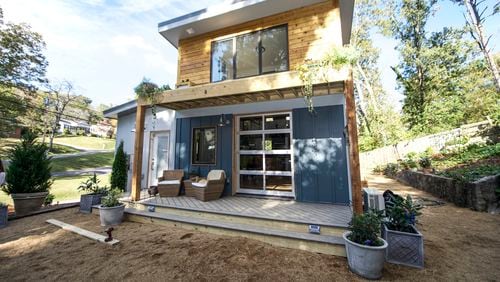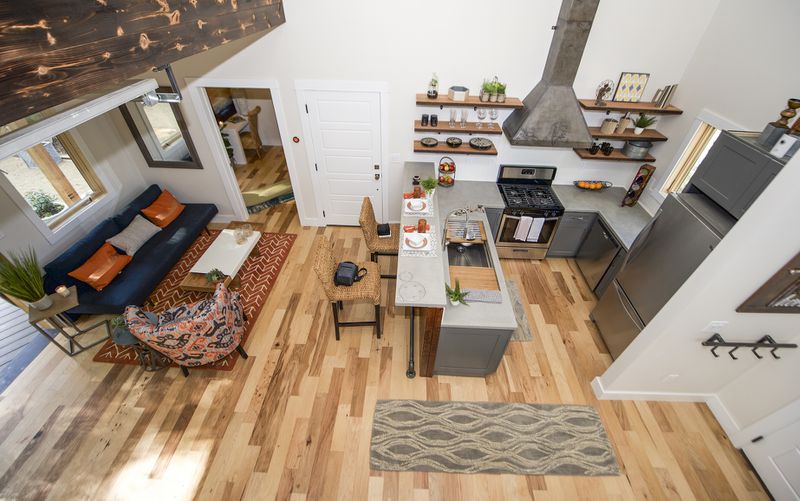The tiny house movement is running into big problems in the Atlanta area.
That's because the tiny house trend is moving faster than local municipalities can change old zoning regulations and building codes.
Simply put, tiny houses often fail to meet local zoning and building code requirements, leaving potential homeowners with major headaches.
It's not a new problem, either. Zack Giffin, co-host of the FYI show "Tiny House Nation," told the AJC in 2015, "I think in urban environments, the biggest challenge is working through zone violations and municipalities...I think in rural environments, there are fewer restrictions because there's more space so people are more comfortable with unique situations."
Defining the tiny house
The city of Atlanta has no formal definition of a "tiny house," which is loosely defined by square footage. The Tiny Life describes a tiny house as being between 100 to 400 square feet.
The city uses the International Residential Code for new construction guidelines. But that only covers construction and not zoning issues established by local governments.
Which laws apply depends on the foundation of the tiny house. If attached to a permanent foundation, tiny homes are essentially single-family dwellings and most area municipalities require that newly constructed homes provide at least 750 to 1,000-square feet of living space. According to the National Association of Home Builders, the average size of a new single-family home in the U.S. fell from 2,674 to 2,657 square feet in the first quarter of 2016.
To get around single-family home requirements, some tiny home owners mount the houses on wheels, which makes them recreational vehicles. But then they face issues about where RVs can be parked. They may even receive pushback from people who own traditional RVs and don't want their parks turned into tiny house villages.
Putting wheels on a tiny house may nto qualify it as an RV anyway. Part of the reason is that some tiny-house builders, including Chattanooga, Tenn.-based Wind River Tiny Homes, are pushing for a separate category for their product and are not certified under the Recreational Vehichle Industry Assocition (RIVA) standards.
Credit: Courtesy Wind River Tiny Homes
Credit: Courtesy Wind River Tiny Homes
Tiny house-friendly areas
If you dream of the tiny life, it's best to seek out tiny house-friendly muncipalities.
Some local governments have been far more proactive in the tiny house movement. The city of Decatur hosted a Tiny House Festival in August that drew 5,300 people. The event was held in conjunction with Tiny House Atlanta, a non-profit organization that advocates for what it calls "lifestyle choice."
According to Angela Threadgill, Decatur's Planning Director, the city is planning to host the event again this year.
"The topic of micro-housing/tiny houses has opened up a larger discussion about socioeconomics in the city of Decatur," said Threadgill. "Data from the Atlanta Regional Commission and census records show the city of Decatur has become a very expensive place to own or rent a home, and the demographics have shifted dramatically over the last decade. Decatur's residents place greater value on diversity than area median income. Creating zoning codes to allow different housing opportunities, such as micro housing/tiny houses, is one way to return demographics to the diversity the city once had. "
Decatur also adopted a Unified Development Ordinance (UDO) in November 2014, which meant the city no longer has minimum floor area requirements for dwellings. "Previously, Decatur required dwelling units to have a minimum floor area; depending on the zoning district it ranged from 800 square feet to 1,800 square feet. However, we learned that if zoning encourages construction of larger dwellings, we block the chance for housing for low- and moderate-income households and households that simply desire smaller footprints," Threadgill said.
The Eco Cottage Village is tentatively set to be the first tiny house community in the Atlanta area. Located in historic East Point, the development will include 40 tiny homes on 7.69 acres. If approved, these tiny homes come with a hefty price tag, as much as more than $125,000 for only 250 square-feet.
According to the development's website, the proposed neighborhood was on the agenda for a City Council meeting in late December, 2016. However, Renita Shelton, public information officer for the City of East Point, said the applicant withdrew its application.
What's next?
Because uniform safety guidelines have yet to be established for tiny homes, zoning and building codes continue to be the biggest hurdle facing potential owners. Supporters of the tiny house movement are trying to change that by getting new guidelines written into the IRC guidelines which would be widely accepted.
Tiny House Atlanta seems to be at the forefront of pushing these changes. They have a page on the website that encourages those seeking this lifestyle to get involved.
RECOMMENDED VIDEO: Touring a tiny house in Cumming
About the Author







